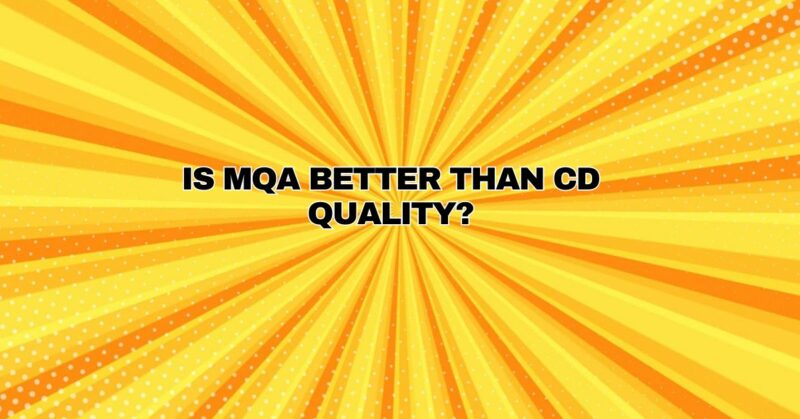The ongoing quest for high-fidelity audio has led to innovations in audio formats and streaming technologies. MQA (Master Quality Authenticated) has emerged as a promising contender, challenging the longstanding reputation of CD (Compact Disc) quality audio. In this comprehensive article, we will delve into the nuances of MQA and CD quality, exploring the factors that distinguish them and determining whether MQA truly offers a superior audio experience.
The Evolution of Audio Quality
Audio quality has evolved significantly over the years, from analog vinyl records to digital CD formats and, more recently, high-resolution audio and streaming services. Each step in this evolution has sought to deliver the most faithful representation of recorded music.
Understanding CD Quality Audio
CD quality audio has been the benchmark for high-fidelity digital audio for decades. Here are the key characteristics of CD quality audio:
- Uncompressed Audio: CDs store audio in an uncompressed format known as PCM (Pulse Code Modulation). This means that every detail of the original recording is preserved, resulting in pristine sound quality.
- 16-Bit Depth: CDs use a 16-bit audio depth, which allows for 65,536 discrete amplitude values per sample. This depth provides a wide dynamic range and excellent fidelity.
- 44.1 kHz Sampling Rate: CDs have a sampling rate of 44.1 kHz, which captures audio frequencies up to 22.05 kHz, covering the entire audible range for humans.
- Widespread Compatibility: CD quality audio is universally compatible with a vast range of playback equipment, making it accessible to a broad audience.
The Promise of MQA
MQA, developed by MQA Ltd., takes a unique approach to audio encoding and delivery. Here’s how MQA differs from traditional audio formats:
- Efficient Encoding: MQA employs a proprietary encoding process that efficiently compresses audio while retaining high-resolution details. This efficient encoding allows for smaller file sizes, making it suitable for streaming.
- Authentication: MQA files are authenticated to ensure that they are true representations of the original master recordings. This authentication provides peace of mind to listeners.
- High-Resolution Capability: MQA can deliver audio at higher bit depths and sampling rates than CDs, surpassing the limitations of the CD format.
Factors Influencing the Comparison
To determine whether MQA is better than CD quality, it’s essential to consider several factors:
- Listening Equipment: The quality of playback equipment, including DACs (Digital-to-Analog Converters), amplifiers, headphones, or speakers, can significantly impact the perception of audio quality.
- Listening Environment: The acoustics of the listening space, ambient noise, and the position of the listener can influence audio perception.
- Source Material: The recording quality and mastering of the music being compared can vary, affecting the overall listening experience.
- Personal Preferences: Audio quality is subjective, and individual preferences play a substantial role in determining whether one format is preferred over the other.
The Nuances of MQA vs. CD Quality
- MQA’s Efficiency: MQA’s efficient encoding allows for smaller file sizes while retaining high-resolution audio quality. This efficiency is particularly advantageous for streaming and downloading music.
- High-Resolution Capability: MQA can deliver audio at higher resolutions than CDs, offering greater depth and detail in the music. However, the benefits of this higher resolution may be more noticeable on high-quality audio equipment.
- Authentication: MQA’s authentication process provides a level of confidence in the audio’s authenticity, ensuring that it faithfully represents the original master recording.
- CD Quality Consistency: CD quality audio consistently provides uncompressed, high-fidelity sound that closely mirrors the studio recording. However, the actual audio quality may vary depending on the recording and mastering process.
Conclusion
The comparison between MQA and CD quality audio is nuanced and dependent on various factors, including equipment, listening conditions, source material, and personal preferences. MQA offers efficient encoding, high-resolution capability, and authentication, making it an appealing option for audiophiles and music enthusiasts, particularly in the context of streaming and downloading music.
However, CD quality audio remains a trusted and widely compatible format known for its consistency and uncompressed fidelity. Ultimately, whether MQA is better than CD quality is subjective and depends on individual priorities, listening setups, and the desire for convenience and audio quality in the evolving landscape of music consumption. Both formats offer excellent audio quality, allowing listeners to choose the one that aligns with their preferences and listening habits.


